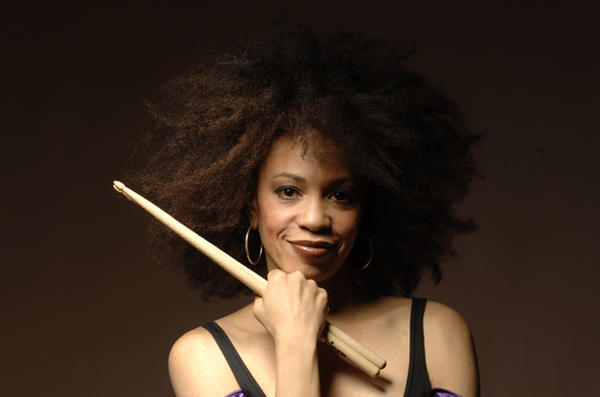True Believer
March is National Women’s History Month! We’ll be sharing stories about some of the most accomplished women in jazz, both nationally and locally. We hope you enjoy this tribute to the women of jazz.
***
She was 7 years old, at a neighbor’s pool party. She wandered inside looking for a bathroom, saw a drum set and, without hesitation, jumped right on. “Just looking at them struck something in my core and it was completely right from the second I saw them. And then when I hit them it was like, wow, that’s me.” She’s never jumped off.
Cindy Blackman convinced her musical family to get a drum set of her own; she played in a school band and attended the Hartt School of Music in CT. But it was when she attended a drum clinic given by Tony Williams that her passion for the drums was cemented. She was especially drawn to the way he wildly moved all four limbs while playing. Cindy left college and moved to New York City in 1982 to become a street performer. She said her experience as a busker provided an invaluable education because she met so many talented drummers along the way. She also encountered a tidal wave of prejudice – racial, gender, over her Afro, even the dismissal of her opinions. “What I learned to do was completely ignore that stuff,” she said.
In 1987, Cindy auditioned for rocker Lenny Kravitz over the phone – he in LA and she in NYC. He flew her to LA the next day, she stayed for 2 weeks and did her first video with Kravitz, “Are You Gonna Go My Way?” She has toured with him ever since. She also still enjoys playing in smaller, more intimate clubs, which she says affords a greater opportunity to showcase her versatility. Her touring and recording has taken her all over the world, including once stepping in as a back-up drummer for rock legend Carlos Santana. Sparks flew and before long he proposed to her on stage – after, of course, she had finished her drum solo. Before the year was out, the two tied the knot in Maui.
Blackman-Santana says that at the core of all her music, whether playing rock fusion or experimental jazz, is her deeply held sense of spirituality. “I believe that music is so sacred that once you are playing music you are doing the work of prayer, whether you’re conscious of it or not, because you have a focused intent. You transcend because you’re crossing barriers that a lot of people don’t normally venture into because we don’t want to think about it. When you can learn to move these energies, even if they’re sad, into something that’s of benefit, like focusing on bringing light to people who are listening or just to the universe in general, then you are doing something good.”
Amen.
9(MDA3NDU1Nzc2MDEzMDUxMzY3MzAwNWEzYQ004))
Become a Member
Join the growing family of people who believe that music is essential to our community. Your donation supports the work we do, the programs you count on, and the events you enjoy.
Download the App
Download KUVO's FREE app today! The KUVO Public Radio App allows you to take KUVO's music and news with you anywhere, anytime!